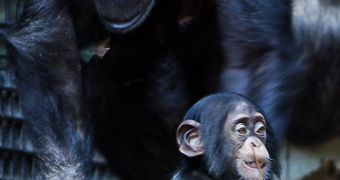The number of chimpanzees in the populations living in Africa's Cote d'Ivoire has diminished by more than 90 percent over the past 18 years, when the last survey was conducted. Researchers analyzing them were stupefied of this find, as only one viable population of the West African chimpanzee subspecies is currently known about worldwide. The rest of the living individuals live in highly-fragmented groups.
Scientists at the Max Planck Institute for Evolutionary Anthropology (MPIEA), led by Genevieve Campbell, said that this was one of the final strongholds West African chimpanzees had, and that if they were lost from this region, it was very likely that the species would never recover. In other words, if they die here, they will go extinct in a matter of months. Mostly responsible for this alarming statistic is the population boom that Cote d'Ivoire experienced over the past few years, with tourism bringing lots of money into the country.
With the outbreak of a civil war in 2002, all international monitoring of protected areas has ceased. Deforestation also plays a large part in the decline in the number of chimpanzees, as the population in the area has increased by more than 50 percent in 18 years. From the 1950s to the 1980s, the West African chimpanzee population decreased significantly, from 100,000 individuals to about 8 to 12,000, respectively. This means that, during the '80s, Cote d'Ivoire was home to more than half of the world's chimpanzee subspecies population.
Taï National Park is the only place where the monkeys can currently be found, although researchers trying to count them only found one nest, as opposed to the over 230 they encountered 18 years ago. Heavy poaching has also taken its toll on the populations and MPIEA scientist Christophe Boesch says that international funding for the protected areas will stop in 2010. "We must appeal to the international conservation community to invest in sustainable funding of conservation activities in national parks with known importance for chimpanzee populations. Our results show that this works," he concluded.

 14 DAY TRIAL //
14 DAY TRIAL //